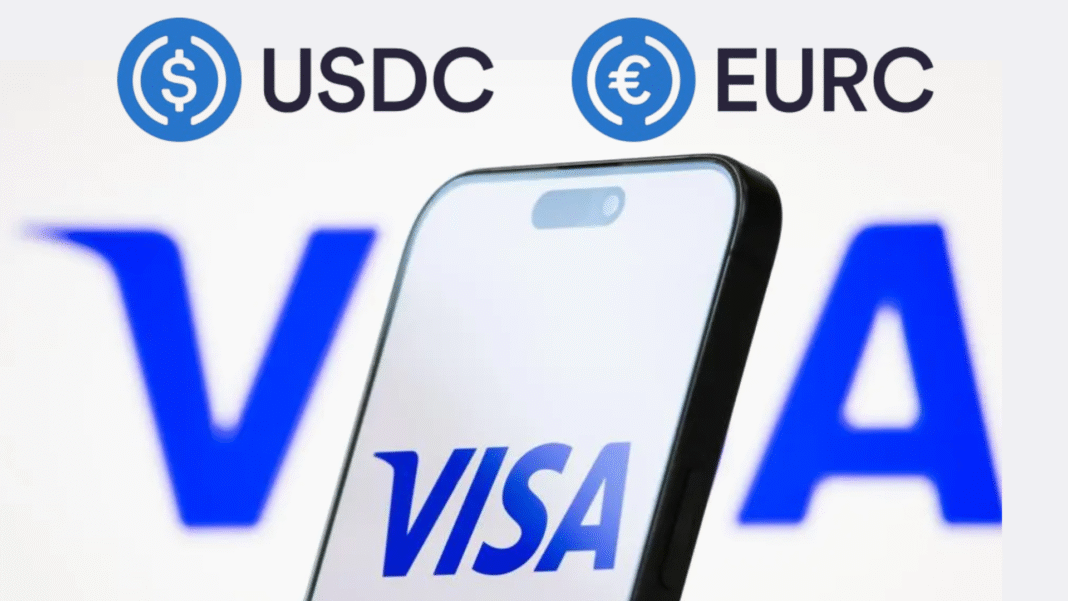Visa has launched a ground-breaking pilot project that uses stablecoins within its cross-border payments scheme, aiming to modernize the way money moves globally.
The Visa Direct pilot, which was announced at SIBOS 2025, allows banks, remittance providers, and financial institutions to pre-fund cross-border payments using Circle’s USDC and EURC.
Chris Newkirk, president of commercial and money movement solutions at Visa, pointed out that traditional systems have left global payments “stuck in outdated processes” for far too long.
According to Newkirk, the new pilot process will also allow for near-instant payouts while minimizing capital inefficiencies in treasury operations.
Stablecoins Treated as Cash Equivalents for Payouts
A key feature of the pilot is that Visa thinks of the stablecoins they are using, USDC and EURC, as cash equivalents to initiate cross-border transactions.
Instead of locking fiat reserves at various payment corridors, a financial institution can pre-fund its Visa Direct accounts in stablecoins.
This allows more efficient capital utilization and helps participants mitigate currency fluctuations and improve liquidity management over weekends or non-working hours when traditional systems are inoperative.
Visa has already transacted more than $225 million in stablecoin transactions; while it is only a small sliver of Visa’s total $16 trillion in annual payment volume, it is a meaningful start.
Also Read: Visa & Mastercard Say Stablecoins Aren’t A Threat As Competition Grows And New Rules Loom
Competing in a Rapidly Evolving Cross-Border Landscape
Visa has unveiled its newest plan just as cross-border payment solutions undergo changes via blockchain adoption.
Just the day before Visa’s announcement, Swift also revealed its own partnership with Ethereum developer Consensys and over 30 global financial institutions to help develop a blockchain-based settlement platform.
These moves indicate growing competition among financial players to offer global payment services and settled transactions in real time, 24/7.
By experimenting with stablecoin integration, Visa is attempting to stake its claim in the race to change cross-border settlements and offer businesses around the world options.
Rising Investor Interest in Stablecoin Payment Startups
The introduction also coincides with a larger influx of cash into companies engaged with stablecoins.
Payments startup RedotPay recently attained unicorn status after raising $47 million with the support of Coinbase Ventures, backed by Galaxy Ventures and Vertex Ventures.
Additionally, at that time, Bastion, a stablecoin infrastructure company, raised $14.6 million with funding from Sony, Samsung Next, Andreessen Horowitz, and Hashed.
These funding events demonstrate high confidence among investors in the future of stablecoins as a consumer-facing payment tool, validating Visa’s decision to pilot the product at this time.
Also Read: Payment Processing Giants Like Visa And Mastercard Compete To Win $253B Crypto Market
Visa’s Ongoing Crypto and Fintech Expansion
This stablecoin pilot program expands Visa’s influence in the digital payments and crypto space.
Earlier this year, on June 20th, Visa partnered with Yellow Card to grow solutions based on stablecoins across more than 20 African countries to assist with cross-border transfers and improve liquidity for businesses in emerging markets, according to UnoCrypto.
On August 8th, we reported that crypto exchange Bitget introduced real-time crypto-to-cash conversion for Visa and Mastercard users in more than 140 countries to further enhance accessibility to fiat.
Together, all of the efforts described herein represent Visa’s approach of utilizing blockchain and stablecoin technology to modernize the global payments market, increase financial inclusion, and help Visa maintain its relevance in a digital economy.
Also Read: Alchemy Pay & Ethena Labs Team Up For Easier Access To Crypto With Payment Via Visa & Mastercard


